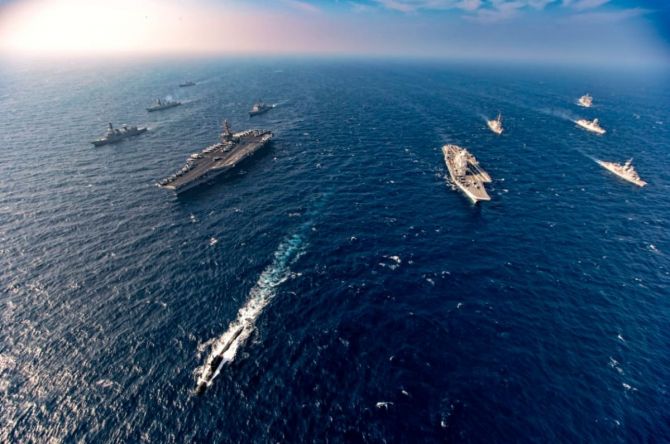China's behaviour in the post-pandemic geopolitical landscape which may determine the Quad's future trajectory, notes former foreign secretary Shyam Saran.

One should thank the Chinese for helping India to 'overcome the hesitations of history' and put the Quad at the centre of its Indo-Pacific strategy.
China's aggressive military manoeuvres in eastern Ladakh encouraged India to shed its inhibitions about institutionalising the coalition of India, Australia, Japan and the US, which form the Quad.
The Quad foreign ministers will now meet annually.
India's security cooperation with the four countries is now underpinned by a series of bilateral logistics, communications and intelligence-sharing arrangements, the last and most important of which is the Basic Exchange and Cooperation Cooperation (BECA) concluded with the US last month.
This will enable India to access geospatial intelligence from the US enabling, among other things, accurate targeting of its missiles.
And to close the circle India has finally invited Australia to join the Malabar naval exercises.
This is important because it is only through these exercises that the Quad countries are engaging with one another plurilaterally.
This is the first step towards plurilateralising the separate bilateral security arrangements that India has with each of its Quad partners.
That prospect is more credible now and could be hastened by continued Chinese aggressiveness not just against India but also Japan and Australia.
India's External Affairs Minister S Jaishankar was reflecting a changed evaluation of the Quad when he described it recently as having become 'central in the landscape ahead'. He projected the Quad as essential to ensuring a multipolar Asia without which one could not sustain a multipolar international order.
Thus, the Quad sits comfortably in India's preferred narrative of seeking strategic autonomy in multipolarity, but the intent of checking Chinese dominance is clear.
The US secretary of state has called for the formalisation and broadening of the Quad. This has not been contested by India.
India would welcome the adhesion of additional partners from both within the Indo-Pacific region and beyond. Indonesia, Vietnam and Singapore already maintain varying degrees of security relations with the Quad countries and these may expand in less visible and informal ways.
If Japan-Republic of Korea relations improve under Prime Minister Yoshihide Suga, then RoK may well join the Quad since it is already a military ally of the US and has good relations with other Quad partners, including India.
From Europe there could be interest from France, Germany and the UK. France has territories in the Indian Ocean as does the UK.
Germany has announced an Indo-Pacific strategy and even ASEAN has declared an Indo-Pacific Outlook. Thus, there could be looser concentric circles of security arrangements with the Quad at the core.
And this may eventually evolve into an Indo-Pacific security architecture that prevents dominance by China and, at the same time, keeps the door open for its participation on the basis of shared norms and acceptance of a rules-based order.
India’s long-held preference is for an open, inclusive, transparent, rules-based and balanced security architecture in the Indo-Pacific, which alone would be appropriate to a multipolar order that Jaishankar spoke about.
But if China believes its security is better served through the unilateral pursuit of dominance in the region, then there will inevitably be a countervailing reaction. This may even take on aspects of containment if China resists restraint on its behaviour.
The Quad should consider a number of graduated steps in response to a changing security environment in the Indo-Pacific.
The next foreign ministers meeting should issue a joint declaration rather than make separate statements. This should reflect the common understanding of its members regarding the role of the group.
Without this, it will not be taken seriously, least of all by China.
There could be a joint statement rejecting Chinese territorial claims in the South China Sea in accordance with the Award of the International Tribunal of the Law of the Seas.
The international agreement concluded by China on maintaining a 'one country, two systems' arrangement for Hong Kong for 50 years could be another issue of Quad consensus.
A warning that any Chinese move to declare an Air Defence Information Zone over the South China Sea may be another step.
As could be a statement supporting a peaceful resolution of the Taiwan issue.
Inviting countries like France, the UK and Germany to a subsequent ministerial meeting of the Quad should be considered. These moves should be kept under consideration as a diplomatic tool kit to be advanced in response to a changing security scenario in the Indo-Pacific. They may not be necessary at present.
Perhaps, they may not be required at all.
Japan has a new prime minister, but he has categorically adopted the Quad as legacy of his predecessor Shinzo Abe.
The US has a new president but one expects US pursuit of a stronger Quad to continue since there is unlikely to be a change in its perception of China as a long-term adversary.
There are voices in Australia advising against a deeper participation in the Quad.
However, China's adoption of punitive trade measures against Australia is facing a political backlash. It would now be politically damaging for an Australian government to be seen as succumbing to Chinese pressures.
Thus, for various reasons each of the Quad countries have even more reason than before to advance their cooperation as a group.
In terms of their combined economic and military capabilities, the Quad members are more than a match for China.
It is their demonstrated willingness to deploy these capabilities in defence of their shared interests that will impart heft to the group. This will also attract other partners, though at different levels of commitment.
The Quad is no longer a hedging exercise. but its path towards plurilateral partnership and potential alliance remains uncertain.
It is China's behaviour in the post-pandemic geopolitical landscape which may determine the Quad's future trajectory.
It may well be that a future historian will see China's pursuit of Asian and eventually global pre-eminence as premature and an error of judgement, triggering a powerful countervailing reaction that frustrated Xi Jinping's China dream.
Former foreign secretary Shyam Saran is a Senior Fellow, Centre for Policy Research, a New Delhi-based think-tank.












 © 2025
© 2025